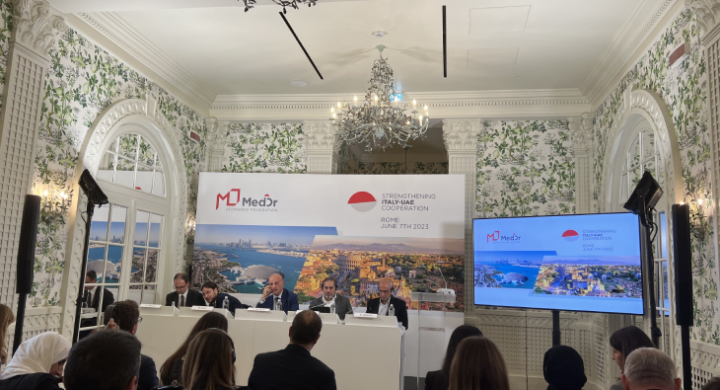Italy-UAE talks in Rome. On June 7, the Med-Or Foundation hosted the “Strengthening Italy-UAE Cooperation” event to celebrate the ongoing revival of diplomatic relations between Rome and Abu Dhabi. Attended by both Italian and Emirates experts, the meeting was the last step of a months-long event series promoted by Med-Or since last October.
- It took place weeks after Prime Minister Giorgia Meloni’s State visit to Abu Dhabi and just days since Rome removed its arms ban on the UAE, as relations between the countries recover speedily from their lows.
Minniti’s speech. The President of the Med-Or Foundation and former Interior Minister, Marco Minniti, began by underscoring the relevance of cooperation between Italy, Europe, and the UAE in dealing with crucial topics such as political instability and energy crises.
- “My conviction is that we cannot have a just and lasting peace without the countries of the enlarged Mediterranean, particularly those of the Gulf. In other words, without the direct and committed leadership of the South” remarked Mr Minniti.
- He then ended his talk with a warning to the international community: “If Tunisia were to collapse, we would risk a dramatic domino effect that could upset North Africa and the entire Mediterranean.”
Baharoon’s vision. Then, the Director-General of the Dubai Public Policy Research Center, Mohammed Baharoon, built upon Mr Minniti’s speech to explain the UAE’s new foreign policy. “Our relations will have an impact on the growth of our countries. There is a new kind of policy based on expanding relationships,” he stressed.
- “That way the Emirates is building its strategic relationship with Italy as they did with India, China, Japan, and South Korea. The Emirates has changed relations with Iran and Israel because we realised that we need partners to meet future challenges.”
Abdulla’s view on regional dynamics. Harvard University Associate Professor Abdulkhaleq Abdulla then focused on the stabilisation process in the Arab world, noting that compared to what is happening in Europe, Arabic countries “have gone from tensions, war, and negative confrontation a few years ago to dialogue and a situation of détente.”
- “The Emirates, along with the other Gulf countries, have led the way for a more peaceful Middle East, contributing to the stability of a region that was unstable for 20 years,” he stressed.
Manciulli’s take on Italy’s role. In his speech, Med-Or’s Institutional Relations Director Andrea Manciulli recalled the importance of remembering the past to look to the future. Italy, he continued, “has forgotten some fundamental traits of its Mediterranean history and of its centuries-old relations with the Arab world.”
- “Italy is a country that had relations with the Arab world when no one else in Europe did. When there was obscurantism towards the Arab world in Europe, Florence welcomed Arab mathematicians.”
Al Neyadi promotes cooperation. Abdulrahman Al Neyadi, Director of Political Planning at the Emirati Ministry of Foreign Affairs, also spoke of the “exceptional” bilateral relations between the UAE and Italy and the importance of strengthening ties in all fields.
- Touching upon the political situation in the Middle East, he highlighted the UAE’s deep conviction that building bridges through dialogue, cooperation, and diplomacy is the best way to achieve peace and stability in the region and beyond.
Al Olama on a greener Future. Sharif Al Olama, Undersecretary for Energy and Petroleum Affairs at the Emirati Ministry of Energy and Infrastructure, opened the session on Energy Transition emphasising his country’s commitment since the 1970s to the energy transition and its uninterrupted investment in renewable energy.
- He then quoted President Mohamad bin Zayed Al Nahyan, noting that “we will celebrate the moment” when, in 50 years, the UAE will “ship its last barrel of oil.”
Focus on regional instabilities. Experts and policymakers then worked over the main crisis in the region within the framework of specifically-aimed sessions.
- Participants in the Libya panel expressed their concern about developments in Libya and the need to strengthen Libyan institutions, including greater transparency, and the UN political process to unify the country through elections.
Sudan was also discussed as a source of regional instability, from the Red Sea to the Sahel and Libya. In this regard, it was remarked that the Meloni government’s recent political interest in the region and the UAE’s prominent role in the area may generate the basis for cooperation between Rome and Abu Dhabi in the Horn of Africa.




